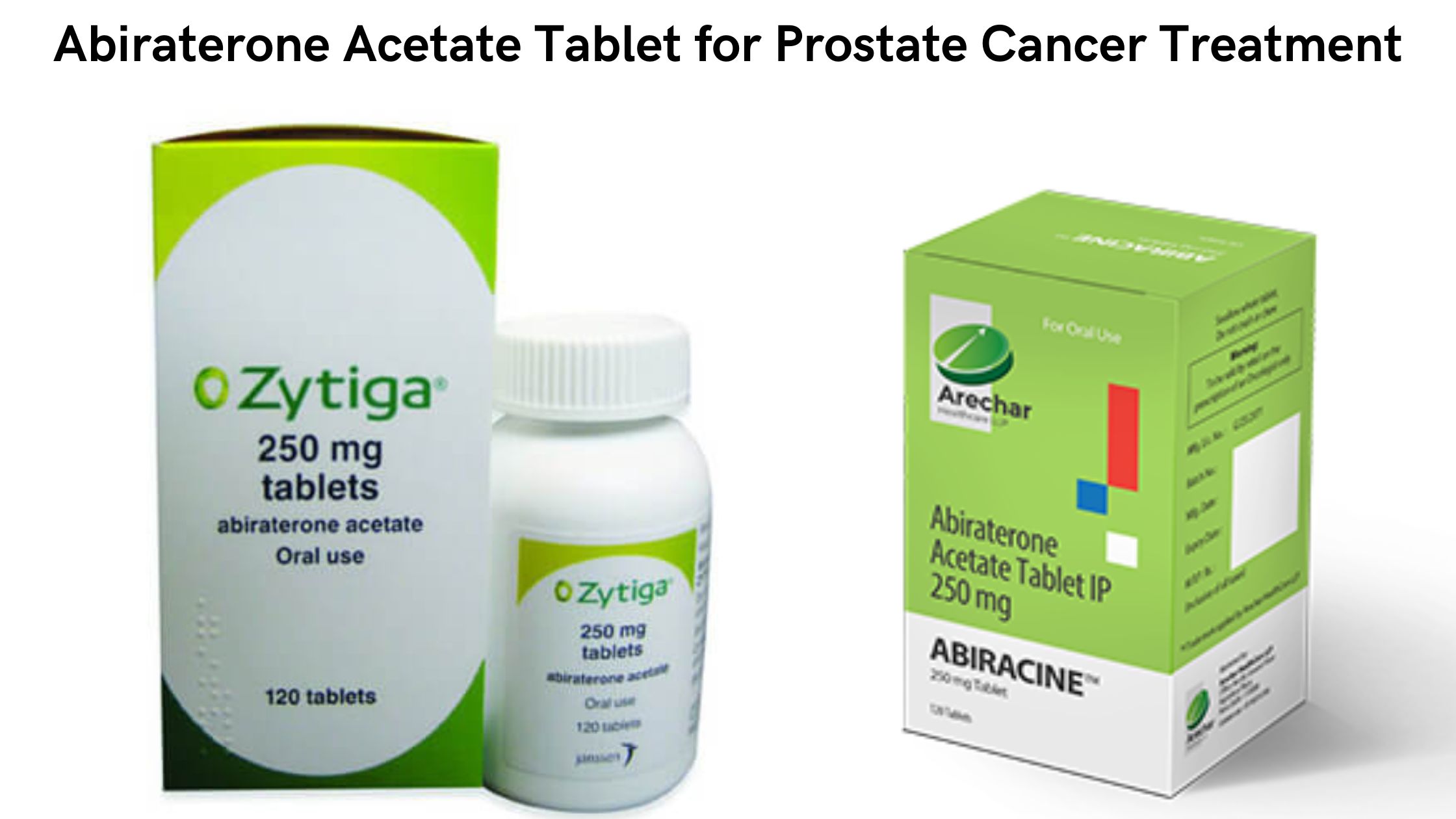
Abiraterone Acetate is a hormone therapy drug. This formulation is indicated for use in patients with prostate cancer. It belongs to the category of androgen biosynthesis inhibitors. It is sold as Zytiga 250mg and 500mg & Abiracine 250mg tablets for oral use.
This drug is considered an antiandrogen. It’s a small molecule anticancer formulation and a derivation of progesterone (steroidal). Experts believe that it is an innovative medicine that is consumed as an acetate salt prodrug. This is because Abiraterone Acetate has a greater bioavailability than Abiraterone alone. The US Food and Drug Administration approved it for prostate cancer treatment on 28th April 2011.
Abiraterone Acetate Tablet Uses
This formulation is used for the treatment of men suffering from prostate cancer. It may help manage signs and complications associated with the tumor.
Prostate Cancer Treatment
Cancer of the prostate gland, if detected early, can be treated with therapy drugs. Symptoms like urination problems, blood in the semen, and erectile dysfunction help suspect the disease. The treatment involves measures like chemotherapy, surgery, and hormone therapy. Abiraterone Acetate is a proven treatment option for prostate tumors. Sometimes, doctors recommend its use in combination with Olaparib.
Clinical Trials
Abiraterone Acetate (Zytiga) was evaluated in the following clinical trial. There may be other studies that examine the use of this drug as a part of combination therapy.
Methods
A placebo-controlled, double-blind included 1199 people having metastatic prostate cancer (recently diagnosed) that can’t be surgically treated. The patients were sorted into two categories:
- The abiraterone group: abiraterone acetate (1000mg oral) with androgen-deprivation treatment
- The placebo group: dual placebos with androgen-deprivation treatment
Results
After 406 patients passed away (at a 30.4-month median follow-up), researchers showed that the abiraterone group had greater overall survival than the latter. Furthermore, 33 months was the median survival without progression in patients of the abiraterone group. Whereas, the placebo group had a 14.8-month median survival.
It was noted that the former showed comparatively better outcomes in accordance with the secondary endpoints of the trial.
Conclusion
The addition of abiraterone acetate and prednisone to androgen-deprivation therapy enhanced overall survival and radiographic progression-free survival. This was relevant only in men with newly diagnosed, castration-sensitive, advanced cancer of the prostate gland.
Abiraterone Acetate in combination with Olaparib
Research: 171 eligible patients were included in a clinical trial. Of those, 142 patients were given either olaparib and abiraterone or a placebo and abiraterone by random selection. The final analysis's clinical cutoff date was September 22, 2017. With olaparib plus abiraterone, the median radiographic progression-free survival was 13 months. Whereas, it was 8 months with placebo and abiraterone. Seven of the serious side effects reported by 24 of the 71 patients getting olaparib and abiraterone and 13 of the 71 patients receiving placebo and abiraterone were related to the respective medication. Pneumonitis caused one treatment-related fatality in the olaparib and abiraterone group.
Experts’ interpretation: For patients with metastatic castration-resistant prostate cancer, olaparib in conjunction with abiraterone was more clinically effective than abiraterone alone. Patients who got olaparib and abiraterone together reported more severe side effects than those who received abiraterone alone.
Pharmacodynamics & Mechanism
It is a steroidal enzyme inhibitor that is active when taken orally. Through covalent binding, it selectively and permanently inhibits the enzyme. The enzyme is abundantly expressed in testicular, adrenal, and prostatic tumor tissue and catalyzes the manufacture of androgen. More specifically, the drug lowers serum levels of testosterone and other androgens by preventing the enzyme from converting 17-hydroxyprogesterone to dehydroepiandrosterone (DHEA).
Evidence: Reduced prostate-specific antigen levels, tumor shrinkage, radiographic regression of bone metastases, and pain relief are all linked to the Abiraterone Acetate tablet. Adrenocorticotropic hormone levels increased up to sixfold, however dexamethasone can reduce this.
How do these hormone therapy drugs work?
Hormone therapy for prostate cancer is called androgen suppression therapy. Drugs, like Abiraterone Acetate, reduce the levels of androgens (male hormones). The two main androgens namely testosterone and dihydrotestosterone stimulate the growth of prostate cancer cells. Such drugs, therefore, stop them from fueling the prostate cancer cells.
Contraindications
Clinicians may not prescribe this drug in the following conditions. Note that this is not the complete list of contraindications. With further research, more may get added.
- Liver dysfunction or impairment
- Pregnancy
- Edema (water retention)
- High blood pressure
- Low blood sugar
- Abnormal results of liver function tests
- Severe liver disorder
- Signs of heart failure
- Medical history of heart failure within the last one month
Zytiga Side Effects
Common side effects of this drug may include headache, seizures, difficulty in breathing, swelling, vomiting, lower back pain, and slow heartbeat.
Skin-related reactions
Dermatological reactions like depression on the skin, sweaty skin, itching, red rashes, darkening of the arms and legs, yellowing of the eyes, and pale skin may occur. Some patients may experience other skin-related issues during the therapy.
Painful conditions
During the therapy, patients may develop pain in the bladder, bones, chest, pelvic area, lower back or side portion, muscles, arms or legs, jaw, and stomach. Some over-the-counter medicines may help with such conditions. However, they must not be taken without the doctor’s advice.
Incidence not known
Zytiga side effects that don’t have any known incidence are as follows:
- Chills
- Hives
- Coma
- Difficulty in swallowing
- Nightmares
- Coughing up blood
- Irregular heartbeat
- Diarrhea
- Cold sweats
- Muscle pain
- Dizziness
Rare side effects
Adverse events such as weight gain, light-colored stools, chest tightness, decreased urination, diarrhea, weakness, difficulty in breathing, etc may occur rarely in patients. As per the clinical trials, these effects were seen in a few patients.
NOTE: Since cancer medicines can interact with existing diseases, don’t take them without a prescription. Visit your medical team regularly (as advised) to report unusual effects. Taking any new medicine during cancer therapy also requires a doctor’s consultation.





